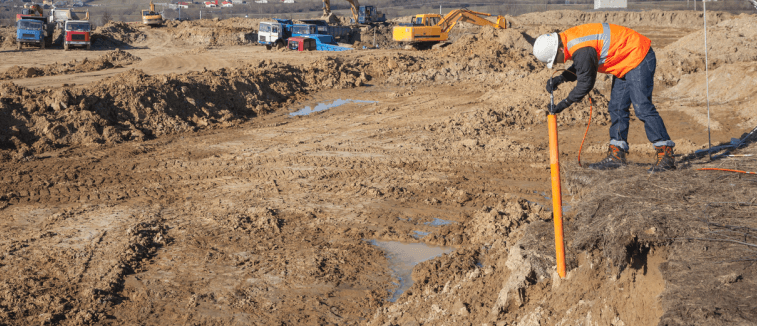All About Geotheta
All About Geotheta
Blog Article
The Best Strategy To Use For Geotheta
Table of ContentsThe 9-Second Trick For GeothetaEverything about GeothetaThe 25-Second Trick For GeothetaNot known Factual Statements About Geotheta
They team up with civil designers, architectural designers, engineers, and various other specialists to integrate geotechnical considerations into the general job design and building process. This calls for efficient team effort, coordination, and communication to ensure that the geotechnical facets line up with the job purposes and satisfy regulative needs.Mining & Products Engineering: Concepts of drilling, penetration rates, and variables impacting the choice of exploration approach. Qualities of nitroglycerins, shooting systems and blast patterns. Blasting strategies in surface and underground workings. Unique blasting methods at excavation borders. Vibration and sound control. Mechanical and continuous strategies to fragmentation, consisting of longwall shearing and fullface boring.
Modelling of fragment and fragment size distributions; comminution as a transfer function. Comminution modern technology: crushing, grinding, size category. Integrated analysis of fragmentation and comminution operations. Offered by: Mining & Materials Engineering.
The Ultimate Guide To Geotheta
Bachelor's level programs in civil, geotechnical, geological, and environmental engineering generally last four years and include general education and learning training courses in English, social science, and the humanities, as well as programs in sophisticated mathematics, structural geology, and liquid mineralogy. (https://flossy-rotate-3d1.notion.site/Why-Geotechnical-Engineers-are-Vital-for-Your-Construction-Projects-7c147cf012a34d1abe5134afbabc811f?pvs=4)
Geotechnical design includes the analysis of the soil and rock problems at a particular site, and their effects for the advancement of that website. As most structures count on the ground for support, it is without shock that a comprehensive understanding of the ground problems, and the viability of structure systems, are vital to the long-lasting stability and performance of the structure or framework.
Specialising in the investigation of geological developments and ground behaviour, geotechnical engineers carry out scientific investigations and screening to recognize the influence these geological formations may have on the layout and building and construction of building, civil and infrastructure jobs. This know-how is crucial for the design and building of structures, roads, tunnels, dams, bridges, and water and sewer system.
The geotechnical group at Douglas Allies routinely talk to designers, layout engineers, programmers, and builders to make suggestions on layout and growth propositions to make certain that the developed structures are accordingly designed for the ground problems. For instance, the design of footing systems needs to think about the weight of the framework, the ability of the ground to support that weight with each other with motion tolerances and efficient building.
How Geotheta can Save You Time, Stress, and Money.
This job is considerably simplified by the use our Douglas Map geospatial system which makes this information conveniently easily accessible in an easy to make use of web browser user interface. A geotechnical designer will direct the boring of boreholes and test pits to gather soil and other samples, and additionally examine surface features and ground exposures to form a geotechnical model of the subsurface conditions.
Relying on the task kind and ground conditions encountered, research laboratory screening might amongst various other things examine toughness, compressibility, reactivity and/or leaks in the structure of soil and rock samples. After this data is gathered and looked at, the outcomes are utilized for a geotechnical version of the site, which is commonly offered as sections across the site.

A geotechnical investigation by nature can just analyze the ground problems at the locations drilled or dug deep into. All-natural variations in soil and rock conditions can occur across a site and in between test places. It is as a result excellent practice that the geotechnical engineer be kept throughout building and construction of the project to offer on-site verification that the ground conditions encountered are constant with the assumptions and suggestions provided in the geotechnical examination record.
The Greatest Guide To Geotheta
Geotechnical engineers use their thorough understanding of soil and rock to examine danger and resolve issues on varied framework projectsGeotechnical design is a specialist branch of civil engineering which considers the behavior of earth products and the application of soil and rock auto mechanics. Tailings Engineer. As a geotechnical designer, you will evaluate the physical, mechanical and chemical residential properties of dirt and rock in order to make structures, maintaining structures and earthworks
Geotechnical design is carefully connected to and overlaps with, both design geology and ground engineering - https://anotepad.com/note/read/ew8kqmw7. It's possible to be experts in geotechnics or work this post for a geotechnical business yet be understood as a design rock hound or a ground engineer. As a geotechnical designer, you'll need to: construct and preserve partnerships with clients and other professionals included in the site, throughout each projectmaintain safety and security requirements on site be mindful of price ramifications when you make recommendationsstudy geological maps and aerial photographs from an array of resources and from different time periodsexamine building and construction prepares to see exactly how practical they are based upon your understanding of the siteinvestigate risks or geological threats for the sitesearch for environmentally sensitive features, such as land fill beginning to create factual and interpretive ground modelsplan area investigationsdrill and analyse samples of bedrock, soil, groundwater and extra products supervise other professionals on sitesolve technological problems as they occur, such as unexpected frameworks at drill sitesmonitor conditions throughout and after building to ensure frameworks are secure in the brief and long termadding information gathered on site to your first researchcreating geotechnical calculations, drawings, and two or three-dimensional computer system designs analyzing the datamaking recommendations regarding the proposed use of the website

Report this page